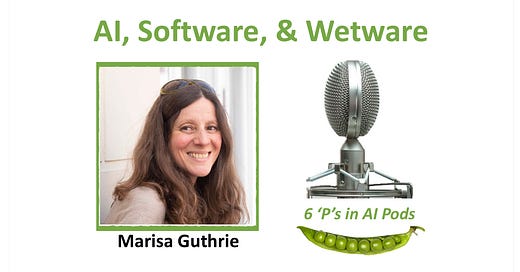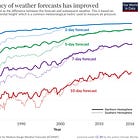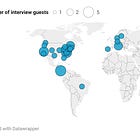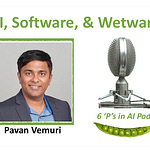Introduction -
This post is part of our AI6P interview series on “AI, Software, and Wetware”. Our guests share their experiences with using AI, and how they feel about AI using their data and content.
This interview is available as an audio recording (embedded here in the post, and later in our AI6P external podcasts). This post includes the full, human-edited transcript.
Note: In this article series, “AI” means artificial intelligence and spans classical statistical methods, data analytics, machine learning, generative AI, and other non-generative AI. See this Glossary and “AI Fundamentals #01: What is Artificial Intelligence?” for reference.
Interview -
I’m delighted to welcome (author of ) from the UK as my guest today on “AI, Software, and Wetware”. Marisa, thank you so much for joining me today! Please tell us about yourself, who you are, and what you do.
It's lovely to be here. Thanks, Karen. So I am a business coach and entrepreneur who helps solopreneurs move out of shame, claim their value, and grow profitably without compromising their ethics. So I help solopreneurs create business models that have social justice baked into them and ensure that their work aligns with both their values and their financial goals.
I love that mission, Marisa. Can you elaborate a bit more on “move out of shame”? In your experience as a coach, what do you find that solopreneurs tend to feel shame about?
Yeah. That's a great question. So what I hear a lot of my clients saying is that they want to be more successful, and they want to make more money in their businesses. And so a lot of the things that they've tried have been, kind of, the received wisdom around traditional business advice. And what I experience is, a lot of that is created for the corporate enterprises and may work at that level. But it doesn't translate down to the solopreneurs, because we have a whole different landscape to navigate. We have a whole different set of problems.
And so what they'll often do is they kind of gaslight themselves into thinking that they're the problem. So my job is to help them move out of the shame of that, so that they can claim their value, claim their place in the world of business, and maintain their kind of sovereignty around who they are in their business.
Yeah. That's a great perspective on it. I guess I hadn't really thought of ‘shame’ as applying to it. I mean, since early last year, I've been on a solopreneur journey myself. And I hadn't really thought about applying shame to any thoughts I have about wanting to be more successful, but doing it in an ethical way. That's an interesting way to frame it. So how do you find that people respond when you call it by that name?
Well, they're just like you. They've never thought of it in that way. But the minute I say it, they go, “Oh, right. That's what I've been doing.” What I talk about is dissolving that shame. And I, you know, since I was little, I've had this propensity to see someone in some kind of discomfort, and try and, you know, neutralise that or take that away. So actually, they really love it.
And then when I start to talk about, you know, the systemic issues of being a solopreneur in a corporate world, if you like, then they really get it. And they get it on a kind of visceral level, I would say, Karen. So, yeah, people like what I have to say, hopefully. Not all the time.
Yes. Well, that's great to hear. I'm curious about your experience with AI and machine learning and analytics, and if you've used it professionally at all? Or if you've used it personally, or if you’ve studied the technology?
Yeah. So I would describe myself as, I don't know if you have that expression in the States, a Luddite. So I'm very tech-averse, and it's pretty limited, I guess. So I would say it's been more like the incidental use of platforms like Loom, Google Docs, simple things like that for my business. But the main way that I use AI right now day-to-day is through ChatGPT, which honestly has been amazing for my business.
I would say that anyone who's using ChatGPT isn't exactly tech-averse! Luddite, that's a very common term here.
Okay, good, good. Yeah.
And, actually, it wasn't that they didn't want the technology. I think it's that they didn't want the people who owned the companies exploiting them as workers through it. It wasn't that they actually opposed the technology itself - which I think is very interesting, because we see something similar today.
We definitely do. And thank you for reminding me of that, because I would say that's my experience and the experience of the solopreneurs that I'm working with as well.
So you mentioned that you use things like Loom and Google Docs and ChatGPT. I'm not familiar with Loom. Can you share a little bit about what Loom is, and what you use it for?
Yeah, so Loom is a platform where you can create videos. And I use it a lot because often when I'm working with business owners, I have lots of tools and resources and things that I use, and some of them are fairly easy to navigate. Others require a little bit of education.
So what I do is, so I don't take up time in session, I will create little videos for them. I also create those videos to answer questions. Because one of the ways that I support my clients is by saying to them, “You know, from the minute we're working together, you've got access to me. So if there's something you're struggling with, don't get stuck. Drop me an email, and I will create a little video answering your question.”
And what Loom does, you can either record the screen, or you can record your face and the screen, or just your face, or whatever. And then it creates the transcript automatically, and it gives a title to the video automatically. So then when I plug it in to the email, everything is there for them. And I love that. I absolutely love it. So it's a really great tool for my business.
That's awesome. I know you just had this master class yesterday. I'm so sad that I missed it, but I'm going to catch up on the recording. But did you use Loom for that? Or was it different tools?
No, I used Zoom for that. So it's got all the transcript there. I mean, I didn't give people the transcript, but it's there if they need it. So yeah, that's another way that I would use AI incidentally, I would say.
Alright. Well, thanks for sharing that - I've learned something new today already!
Right.
So that's great. Can you share a specific story on how you've used one of these tools that has AI or machine learning features? And maybe ChatGPT, since you say you use that a lot? I'd like to hear your thoughts about the AI features of the tools and how well they worked for you or didn't.
Yeah. So great question. I started using ChatGPT, I would say, about 2 years ago with limited success, because I didn't know how to use it properly. So, I'm a content marketer, so all my marketing really comes from my content. So my biggest task in my business, pretty much, apart from actually delivering the work with my clients, is sitting down to create and publish content. So I was looking for a way to kind of make that process more efficient.
And when I started using ChatGPT, I was getting fairly generic results, which I felt pretty disappointed with. Because, obviously, from the introduction, I'm probably not your average business coach. My content is quite anti-establishment. It's quite anti-capitalist. So when I was asking ChatGPT for content that micro businesses and solopreneurs would respond to, it was giving me fairly generic, traditional, and what I would describe as patriarchal content. So just the stuff that we kind of hear all the time.
It wasn't until I sat down with a friend of mine who's had amazing results with ChatGPT for her business, and she said, “You know, you've gotta keep pushing back.” Because the prompts I was giving it were not well-conceived. So my prompts were fairly generic, which is why I was getting quite generic content coming back. So what I did was: I sat down and I had a quote-unquote conversation with ChatGPT. And I was like, “Okay. This is who I am. This is what I stand for. These are my values.” and sort of had this conversation.
I'll share this with you and the listeners is that I actually asked it to coach me on something. And I said, “Okay. Imagine you're my coach. I'm struggling with this mindset thing at the moment. Can you give me some advice?” And it was fantastic.
So once I started giving it those better prompts, things just changed. And they changed really fast in my business. I use it all the time.
That's great that you figured out how to prompt it more effectively. Can you share a specific example of a task or a topic that you used ChatGPT to help you develop? And I'm curious. Is it saving you time on creating your content? Or do you feel that the time is overall about the same, but maybe your results are better?
So no, it's definitely saving me time. So I write notes in Substack every day, sometimes more than once a day. And then I repurpose those and I put them onto LinkedIn. And the way that I do that, I make sure that I batch that activity, like, month by month.
So I will say to ChatGPT, “Okay, here's what's happening this month. These are the topics and these are the themes that I want to explore and I want to talk about. Give me some content that I can use for Substack Notes, and that I can then repurpose for LinkedIn.” So that has, I mean, it's no word of a lie, Karen, it's kind of miraculous how much time it saved me and how ridiculously happy it makes me.
Because sometimes, you know, sometimes the first answers it gives me back, I'm like, “Yeah, no, that's not so, that's not really it. These are the last ones I did. This is what got really good results. How about giving me some more like that? And make sure that it's my style and it's my tone of voice and it's the sort of things that I would say.” And then I will say, you know, “I don't really use a phrase like that”. Or “That sounds a bit too generic.” And then I will get a month's worth of posts from that.
And, again, I don't, copy and paste them over. I will always take that as an idea, and then I will, you know, write the Note myself, as it were. But that speeds up the process. It makes it really fun and enjoyable. I feel like I've got someone in my corner that I never had before.
And if you'd have said this to me, like, 2 years ago, I would have laughed in your face. I would have said “There is no way that I am going to be interacting with AI in a way that makes me feel really happy.” So, yeah, it's been good to me.
Well, that's good. So if we were to look at some of your recent Notes in Substack, those would be notes that you brainstormed with ChatGPT about writing those Notes? And then also on LinkedIn as well?
Yeah. For sure. And what's interesting is - and when we first connected and I looked at what we were gonna talk about, I realized that what's changed for me as well is that some days, and I'll get up and be very strategic, I sit down and I have my coffee and I write my Notes, like, first off the bat. It's the first thing I do in my day.
And sometimes I will just find myself, based on something that I brainstormed with ChatGPT maybe the day before, or a couple of days before, or that week, that I'm just off and running. And I don't even need to check-in with ChatGPT because I've already gone, “Oh, okay, this has given me an idea for something else I'm gonna talk about, and I'm gonna talk about it in this style and and in this way.” And then I've noticed, “Oh, hey, I didn't even need it.”
So it's making me be a better me, if that makes sense, and if that doesn't sound too weird. And, again, this is as much a surprise to me as it is to anybody else, because I would not have predicted that at all.
Right. A lot of people, when they talk about AI, they assume it means ‘Artificial Intelligence’, and it's somehow replacing humans. But there are a lot of other things that the A could stand for, like, what I like is ‘Augmented Intelligence’. It's meant to augment us, and augment our human brains, our wetware, which is what I talk about with this interview series, and it's not meant to replace it. And so it sounds like you have a productive collaboration.
Yeah. Augmentation. That's really good. I really like that. Yeah, it does feel like a collaboration, truly. And yeah, it makes me ridiculously happy. I mean, I've never had this level of support in my business before. So it's making me more efficient. It challenges me, and I'm getting better results, and engagement across the board since I've been using ChatGPT, opposed to the 15 years before that when I wasn't using it, right?
That's great. Have you avoided using AI-based tools for anything? And if so, can you share an example of when, and why you chose not to use AI for that?
Yeah. So this is interesting because I'm currently writing a book. My Substack is called The Reluctant Capitalist, and my book is going to be called The Reluctant Capitalist. And when I started writing the book, I made a conscious decision not to use it to help me write the book - writing, you know, the actual content and copy of the book. So I'm only using it at the moment for things like, if I'm looking for a new turn of phrase, or if I'm looking for a different way of expressing an idea.
I also just decided not to use it for any research because for me, at least on that front, I have found that it can be somewhat unreliable. The book is going to be about how solopreneurs navigate this capitalist system that wasn't designed for them to thrive. And so it requires both a short history of capitalism and of neoliberalism. So it has to be accurate and well-researched if it's going to be credible, and I can't run the risk of having poor research. So it's a very conscious way that I'm not using it for my book, if that makes sense.
Yeah. Absolutely. There's a definite risk of what Charlotte Tennant of called ‘hallu-citations’.
That's good!
Which is very real. So it sounds like a wise decision to avoid AI for your book writing and for your research. But I'm curious. Are you already working with a specific publisher, or are you planning to self-publish? Because I'm wondering if your intended publisher or platform have any restrictions on the use of AI for creating book content, whether it's for the text or for the images.
Yeah. Really good question. So it's a big question, Karen, because I've submitted to a publisher already, and you know, this is pretty nerve-wracking to share with you and the audience! But I've just sort of started that journey. Because, obviously, with some publishers, you can submit directly to them. For other publishers, you need an agent. So I'm just exploring what the different options are now.
It's very interesting as well what you said about self-publishing. Up until fairly recently, I was fairly anti self-publishing because it just feels like it's a lot of work. However, I'm increasingly encountering writers on Substack who are self-publishing on Substack with really great results.
So the jury's out right now. I haven't seen in any of the publishing houses that I will be submitting to anything specific about AI. But I imagine that they've got some way so that, you know, you haven't just said to AI, “Write me a 60,000 page book called The Reluctant Capitalist about these things.” So I'm assuming that they've got their own kind of checks and balances on how they do that. So ask me at the end of the year when I am hopefully published, and maybe we'll have another conversation again.
Oh, that sounds like a great idea! Let's plan on doing that.
Yeah.
For self-publishing, when I started my own solopreneur initiative last January, I was digging into writing some of my own books about AI. They're in draft. But I'm actually going to have something else come out sooner.
But, I looked into different options for self-publishing, and working with agents, going directly to different kinds of publishers, or hybrid publishers. And with the self-publishing, I've seen a few people say that they are going to basically serialize their book on Substack. But then there are other people that go with using Amazon and their KDP platform to basically self-publish their book that way. There's a lot of different flavors.
And so this whole step of going from being a writer to being an author, there's a whole lot to it. A good chunk of last year, in addition to writing, was trying to learn more about that side of the business. There's a lot to learn!
Well, we're in the same place then, Karen, because this is what I realized as well is that, in addition to actually, you know, writing the darn thing, I'm probably gonna take as much time researching all the ways to publish. But, you know, it's exciting. And I tested the name, The Reluctant Capitalist, with my Substack to see what kind of response I got, and it was a good one. So that bodes well, and it's good for a publisher to be able to see that as well, that it's a name that people will get behind.
So yeah, let's have this conversation, at the end of the year and see where we're both at. But that's really exciting for you as well, hey?
Yeah. It is. It's been really a lot of fun. ‘Reluctant Capitalist’ is a great title! Do you have a target date for when you think the book might be coming out, or is that still in the works?
Yeah, no, I think that's a premature discussion right now.
Alright. So one concern that I hear a lot about nowadays is where these AI and ML systems and tools get the data and the content that they train on. So they often use data that users have put into online systems or have published online. And some companies are not transparent about how they intend to use our data when we sign up. And they're not transparent about, necessarily, where they get the data that they use in these tools. I'm wondering how you feel about companies using data and content for training their AI and ML systems and tools. And, specifically, I'm wondering, since you talk about ethics, for an AI tool company to be ethical, should they be required to get consent from people and compensate them when they use their data and their writing and other content for training?
Yeah. It's such a great question. I don't know if I'm fully qualified to answer it, but I'll certainly do my best. I mean, yeah, I think it's problematic, and I think it's an extension of what we've been dealing with since the inception of the Internet. But the bit like you said, it's problematic. Because in truth, once something is out in the sort of public domain, it's like Pandora's box. It's very hard to put a lid back on that box, right?
But the difference comes from, if they are using it to train their tool, and then they're monetizing that, right? Because that's extractive, it's exploitative, and of course, that’s all the things that I meet head on in my business.
I think in an ideal world, there could be some kind of compensation. But whether that could be enforced or policed, and also what that compensation would look like, you know?
I mean, I'm such a small fish out in the big world, relatively. But if someone had plugged my content into something like ChatGPT, and then was using that to make their version of something, I'd be pretty upset, you know, and then sort of weirdly flattered at the same time! But, you know, if OpenAI were then able to monetize that person's interaction, of course, that's really problematic.
So, yeah, again, I think these are the kind of conversations that go on, aren't they, about the ethics of AI? Kind of, across the board, with all the kinds of tools that we're now engaging and interacting with. So I think it's for others, you know, that are more qualified than I to really speak to that with more authority. But I certainly think that there is a way that we need to legislate for that, right, both in your great country and in mine, about how we protect those people and make sure that they're being fairly compensated. I don't know what your thoughts are about that, Karen.
Yeah. I mean, it's definitely true that data scraping is not a new problem. That's been going on for years. But I do think it's important that we distinguish between ‘publicly available’ and ‘public domain’. Because, at least in the US, ‘public domain’ has a very specific legal meaning. It means that someone has intentionally waived their intellectual property rights, and they agree that anyone can use it for any purpose whatsoever. And just putting something online where anyone could access it, making it publicly available, does NOT make it public domain - at least not in the US.
But, of course, laws and interpretations can vary significantly around the world, and that's part of what makes data management and IP regulations so complicated nowadays. Because these AI tools scrape content from all over the world. And they're used by people all over the world. And people were uploading things for it to analyze all over the world, and they may or may not have rights to that content. So it's definitely complicated.
I think at this point, all that we can really say about how ownership rights are enforced or policed is it's “unevenly and at great expense”. If you automatically have the copyright to something, but you haven't registered the copyright, or you have to basically sue to enforce it, that's pretty tedious. But, obviously, you wouldn't want your book to be ripped off, like you were just describing, by someone.
There's, I think, a distinction between content that comes from an established publisher and a book, and there's been a contract, and the book has a name, and the content is traceable. Versus things that people put online, that maybe don't have a link necessarily to the person, and even if you wanted to compensate them, you can't find them or be sure who the right person is.
So I think it's definitely complicated. But there are a lot of big discussions and lawsuits around consent and credit and compensation, or what some people call the “3 C's of creative rights”1. So I don't think this is going to get settled anytime soon, but it's definitely an active area.
Yeah. And I've just learned so much by what you just said as well, so that's really great information for me. So I will go away and try to consolidate my thoughts in a more coherent way. Yeah. It's a really good point, and I think people need to be really aware of it.
Yeah. That's great. So as someone who has used AI-based tools, do you feel like the tool providers - for Loom and for ChatGPT and for Google even - do you feel like they've been transparent about sharing where the data for those AI/ML models came from, and whether or not the original creators of that data consented to it being used?
Well, again, you know, I don't feel that I'm massively qualified to answer this question, but I will do my best. And for me, it leads to another kind of problem and a question. Because what I see is that a lot of these products and the models are made in the image of the people creating them.
So for my part what I see, and I know this is changing a lot, but what I see is that the world of tech is still very male-dominated and, you know, kind of patriarchal. There's other people that have written books about these things. Just thinking about things like, an Apple phone is designed for a man's hand rather than a woman's hand, for example, you know? So I'm just giving a very kind of simple example. But I think we have to be aware that these tools may become a perpetuation of that culture, and so we need more diversity in the culture.
So, for example, when I did this exercise a few years ago, and I did it again recently in preparation for this call, but if you type the word ‘entrepreneur’ into Google Images, you mostly get photos of white men in suits, which is really problematic. Because I've been working in entrepreneurship for 30 years, and I see the whole world come through my office, and not just white men. And I certainly don't work with anyone who wears a suit or who sits in a boardroom.
So the issue for me is that the tools become made in the image of the people that make them. And if that representation is nonexistent, we're just going to keep hearing the same voices. We're just going to have those kinds of models perpetuated. And so, obviously, you know, you've got AI then choosing the things that it puts in front of you.
So I think that we need more representation of our global culture in order for those tools to really serve humanity in the way that those creators really say that that's what they're there to do. Because, you know, I've met Silicon Valley tech guys who are super successful, and that's what they wanna do. They want to change humanity. They want to change the world, and I'm all up for that. But let's make sure that that world is our broad global world, not just the small world of those people that are creating those tools.
Yeah. That's a really great point, Marisa, so thank you for bringing that up. It's absolutely true that all of these systems that use data will typically perpetuate, and sometimes they even reinforce or worsen, the biases of the data and the world that the data came from. And we really need to hold people who are developing the tools accountable for being proactive about detecting and addressing those biases. And a lot of times, it seems like companies are so stressed about getting to market early that they cut those corners and don't do it, and it's very hard to fix that after the fact.
Sure. And, again, it's another one of those things where the debate rumbles on, right?
Yeah. You said in a recent post that AI has made you more creative. Could you expand on that a little bit? Or do you feel like we've already covered it?
Yeah, I think it's just a continuation of what I said before. It was when I started to plug in the content that was really working, and I said, “Okay, this is performing well. Can we have more of that? Let's improve upon it.” And then making sure that I then did buy the paid version and that the memory was on.
And so that is just it's gotten to know me so quickly and is then, as I said, sort of augmenting my content. So, yeah, it's driven sales, and it's definitely helping me, you know, so much in ways that I was kind of floundering before, or I was managing, but not in such an efficient way.
So that sounds awesome. I'm wondering if you have any specific example that you could share about content that you enhance with AI that is driving sales for you? And maybe even give some idea of how much of a difference it's making to your business - percentage or dollars or pounds, or whatever makes sense as a way of thinking about impact?
Yeah. So for example, when I'm writing sales copy, specifically sales copy for things like my website or for my newsletters. I will say “I want help writing a sales email, but remember that I dissolve shame. We're not pressing pain points. There's no FOMO here. We're not trying to activate people's …” and I literally give them all these promises. And these are the things that I want to address, and what I want to talk about. Because sometimes it will put things back to me, and I'm like, “Yeah, no, they’re just traditional sales tactics that are based on FOMO and fear, and that is not the way I operate.”
So when that's happened, I now have more people. So, gosh, it's very hard to say, like, putting numbers to, and I couldn't say “these sales are attributed to AI”. But I know that my content across the board is getting better results, because I get more people engaging with it. I get more comments. I get more DMs. I get more people booking sales calls than I did previously.
So I would probably be able to look back, like, after a year and say, okay. I can attribute. Because I track all my sales data and say, “Okay, this was the game changer. This is what made the difference.”
But it's more what I would say is a series of small things, rather than one big thing, you know? So it's just the little ways in which it's helping me be able to craft content that is ethical and it aligns with all my values, as well as being effective and, you know, doing the job that I need it to do.
So, Marisa, what other ways is AI helping you in your business? And what do you think that solopreneurs who are resistant to AI need to know?
So, really, across the board, what it gives me now is TIME. Valuable time. Because the tasks and activities that used to take me hours now literally take me minutes.
And that time that I didn't have before is now diverted into more creative activities. So it means I can focus in on other things of my business, because it gives me the freedom that I didn't have before. I don't stress about having to think things through or coming up with an idea.
So I'm about to launch a group offering, which I haven't done for some time. And it's like 16 weeks. And I need 16 weeks worth of content, but I'm not stressing about it. A lot of it I've created anyway. But I just feel like I've got the kind of framework. So if I need anything else, I'm just going to jump in ChatGPT, and it's going to give me what I need. Weirdly and it's only, like, saying this out loud, but truly my stress levels have come down.
For example, the other day, I was messaging people, asking my followers if they wanted to come to my master class. And I could just jump on ChatGPT and say, “Okay, I'm needing this kind of message, and this is what I'm trying to achieve, and I want it to have this tone.” And I just got it done. Before, it would've taken me half an hour to write the message that I needed to send, right? And, again, I modified it. I didn't want it to be the same for everyone. But things like that are just, they're a game changer for me. And it may sound weird, but I feel like I have support in a way that I didn't have before. So it's great.
It sounds like not only is it giving you more time, but it's also helped maybe your confidence - that when you're looking at something like planning out a 16-week masterclass, that you are more confident that you can do it, that you don't have this worry about whether or not you're going to be able to generate enough of the right content in time?
Yeah, and again, I have many clients that are very resistant to ChatGPT. I just use that as one example because so many of the solopreneurs I work with, content creation is one of the major things that they struggle with.
And I'm just saying, “Look, just put your reservations to the side. This is my experience.” Because, again, ethically, I don't tell my clients to do anything that I haven't done myself.
And I'm just saying, “Okay. I was where you are. Trust me. This is how it's been a game changer for me. This is the way I want you to use it, but really start engaging with it.” And just seeing how it goes, because I think that it will help those business owners. It's going to help them, but that also ultimately helps the people that your business serves, right?
So I'm more present for my clients as a result, because I don't have this stress of, “Oh, God, I've gotta get through this hour session so I can get back to writing a heavy load of content”, you know, notes for a month or something like that. I'm just like, “Great. That's fine. I know that I'm covered.” So, yeah, it's very freeing, and it's just given me a lot of freedom.
Yeah. Freeing up time and your creativity - I'm sure that every solopreneur out there could use both!
It's gold, right?
Yep.
Gold!
So what would you say to business owners and solopreneurs that feel like using AI tools, specifically ChatGPT, is cheating?
Oh, I love this. My daughter's 15, and, obviously, they're not allowed to use ChatGPT for doing essays at school. They're allowed to engage with it. But she has this ongoing thing that it's cheating. And I'm the older person and I'm the one trying to convince her.
So I love this because, you know, every advance in human history has been viewed with suspicion and fear. The printing press, you know, people smashed it up. They were intimidated by it. They were afraid of it. We felt the same about the Internet. You know, it was really scary. And now AI, it's just another iteration of our human development, right?
So for me, I welcome anything that's going to allow entrepreneurs to grow and develop their businesses. I don't see it as cheating at all. You know, for me, the voice that I use in my content is still mine. But now I have an editor. I have a collaborator to help me hone and refine before it goes out to my audience. So is that cheating? I don't think it is cheating.
Is it cheating to have help with research? Well, we would have said that about the internet, you know, a few years ago.
Is it cheating to have someone to bounce ideas off? Of course it isn't.
So people should be, you know, solopreneurs especially, should be utilising it to help the people your business serves, and not to fear it.
And I think, again, what I would say is, coming back to what we were talking before, about the voices and this diversity. We desperately want the purpose-led visionary solopreneurs to have their voices on ChatGPT. You know, we want ChatGPT and those models to get to know those people as well. Because otherwise, if they don't engage with it, then we leave it to everybody else, right?
It's like a lot of the conversations that are being had around Bitcoin. It feels really similar to me - that, “Oh, it's bad”, and it's this, and it's that, and “It's really evil”. And it's, you know, funding a lot of awful things in the world. And it's like, yeah. But we, the good people, need to engage with it. So then we get more agency around it. We get to understand it. I worry about things that people are intimidated by, that they won't then engage with. Because then that leaves it to everyone who isn't intimidated. So I would say, “Just try it. Just try it. Come back to me. Let me know.”
Yeah. I think everyone has to figure out in terms of ethics and what helps them to sleep better at night. I've been working with AI tools for over 10 years, 15 years now. And I studied it a LONG time ago, back when I did my Masters. So I'm very familiar with it. It's not a matter of fear. But I do have concerns about the ethics of using, or especially paying money to someone who built a tool that was based on exploiting content that was basically stolen from other people that I don't want to harm.
And so there's something there that I feel like we need to look at. Try to find more ethical tools. Try to find ways to encourage them to be more ethical. Or to say that, if you're going to scrape all this content from the public, then you shouldn't be making money off it, or it shouldn't be just this handful of people that are making money. My friend Mary Marcel described it as “socializing the inputs and privatizing the outputs”.
Oh, that’s good.
And that doesn't seem fair.
Yeah.
That's the one part of it where I have still mostly avoided it. When I – IF I – can find a tool that I feel was built ethically, I will be all over it. But until then, I really have reservations about using it. I've been reading up on some things about Anthropic - just got an ISO certification. And I want to dig into that a little bit more to understand it. But that might help me to feel like they're at least being more ethical, if that's a way to look at it.
Yeah. For sure. I mean, we're all complicated, aren't we? What one person finds acceptable, another person doesn't find acceptable. You know, I have a red line drawn under Amazon. I don't use Amazon, and I haven't for many years.
But yet, as you say, I'm giving my money to a tool like, you know, ChatGPT and OpenAI, which is problematic. And yet I'm using it to harness a movement to help people. So it's so nuanced and complex. And I feel like, you know, having conversations like this is really important because it gets us to engage. Like, you've really made me think today, Karen. So many things you've said are, like, genius and pretty important. And it's stuff I need to go away and kind of reflect on and think about as well.
So I think if we can keep engaging in any capacity, then it's more valuable to be able to do that rather than just say a blanket, “I'm not gonna engage. I'm not interested.” Because really that belies fear, right? You know? It's like when we become fearful, we kind of shut down. I really appreciate you and what you're doing with your great knowledge, to be bringing these kinds of things to people's attention. So, yeah, thank you so much. I've learned so much today.
Well, I always learn something from everyone I talk to! And certainly I've learned some things from you about the world of solopreneurs and how to help them succeed, which is super important to me. So that's valuable. I appreciate you making the time for that! Is there anything else that you'd like to share with our audience today?
Yeah. So if you like what I have to say, then, obviously, you can follow me on Substack, where you get to hear more of that juicy stuff. If you're interested in working with me one time, you can check out my coaching programmes. What I do in those programmes is, I work together with you to bring your business into alignment with your personal and financial needs. So we look at setting your goals, attuning your pricing to build supportive systems for you, and build really an ecosystem and a business model that's rooted in social justice.
And, you know, the idea is that you'll transform from just making ends meet to building a foundation that empowers you to thrive and uplift others. So I offer a free 60-minute call so we can explore exactly how I can help you in your business with all of that. I also offer a 90-minute breakthrough session, and that is literally deep-diving into one problem that's really holding you back or slowing your momentum. And just pinpoint what's standing in your way so we can get a solution for you to be able to move forward. So, yeah, I just want to say, thank you so much for giving me the space and time to talk about all these things, Karen.
I enjoyed our conversation, Marisa, so thank you for joining! And your programmes sound amazing. I really appreciate you making time for the interview, and wish you a lot of luck with your group and your 1-on-1 coaching, and your book - looking forward to that.
Gosh. Yes. Well, watch this space! And likewise, Karen. Thank you so much.
Great. Thank you, Marisa.
Interview References and Links
Marisa Guthrie on LinkedIn
Marisa Guthrie on Substack
About this interview series and newsletter
This post is part of our AI6P interview series on “AI, Software, and Wetware”. It showcases how real people around the world are using their wetware (brains and human intelligence) with AI-based software tools, or are being affected by AI.
And we’re all being affected by AI nowadays in our daily lives, perhaps more than we realize. For some examples, see post “But I Don’t Use AI”:
We want to hear from a diverse pool of people worldwide in a variety of roles. (No technical experience with AI is required.) If you’re interested in being a featured interview guest, anonymous or with credit, please check out our guest FAQ and get in touch!
6 'P's in AI Pods (AI6P) is a 100% reader-supported publication. (No ads, no affiliate links, no paywalls on new posts). All new posts are FREE to read and listen to. To automatically receive new AI6P posts and support our work, consider becoming a subscriber (it’s free)!
Series Credits and References
Audio Sound Effect from Pixabay
If you enjoyed this interview, my guest and I would love to have your support via a heart, share, restack, or Note! One-time tips or voluntary donations via paid subscription are always welcome and appreciated, too 😊




















Share this post